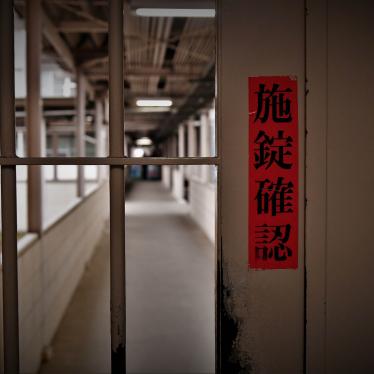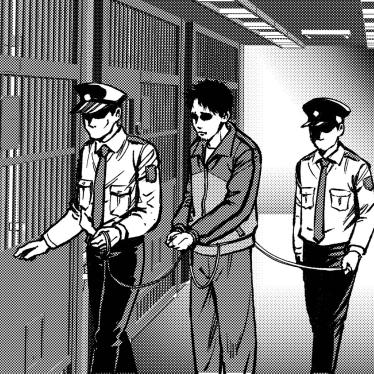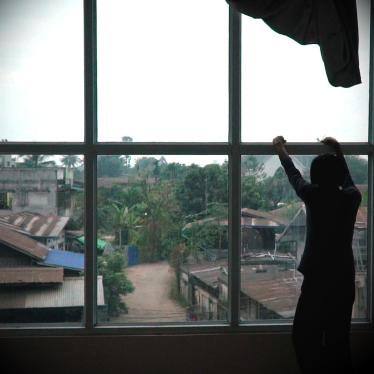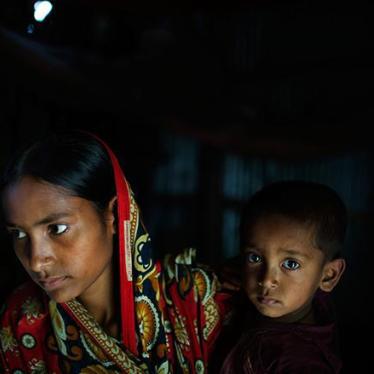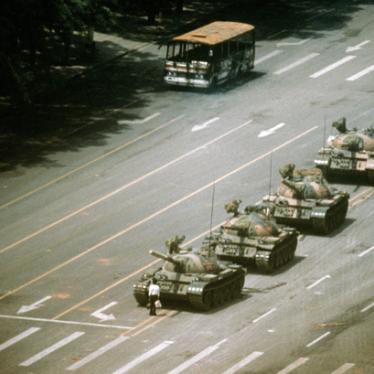(ラングーン)2015年11月8日に行われるビルマ総選挙には根本的な欠陥があり、ビルマ国民は自らの政府を自由に選ぶ権利を奪われていると、ヒューマン・ライツ・ウォッチは本日述べた。選挙プロセスには体系的で構造的な問題がある。たとえば独立した選挙委員会の不在、与党による国営メディアの支配、議席の25%の国軍への割り当て、差別的な有権者登録法、ビルマの一部で生じている多数の人の選挙権剥奪などだ。
「投票日の11月8日に有権者が長蛇の列を作っても、根本的な欠陥のある選挙が自由で公正なものになりはしない」と、ヒューマン・ライツ・ウォッチのアジア局長ブラッド・アダムスは述べた。「今回のビルマ総選挙は、国軍が支える現政権が改革と民主国家建設に真摯に取り組んできたかの試金石だ。しかしそこには致命的な欠陥がある。選挙委員会は偏向し、国営メディアは与党に支配されているほか、ロヒンギャなどから選挙権と被選挙権を奪う法律や政策の存在も挙げられる。」
今回の総選挙では、1990年以来初めて本格的に国民の意思が問われることになる。1990年総選挙では野党・国民民主連盟(NLD)が圧倒的な勝利を収めたが、国軍によって結果は無効とされた。
ヒューマン・ライツ・ウォッチによれば、国際社会が自由で公正な選挙の構成要素と認めるものの多くが、ビルマの選挙実施過程には存在しない。たとえば表現・結社・集会・移動の自由の権利、暴力・威嚇・脅迫のない環境での候補者と投票者の参加、普遍的で平等な選挙、立候補権、投票権、秘密投票権、差別のないことなどだ。こうした権利の行使にあたっては、実効性を持ち、中立で独立した、責任ある行動をとる選挙執行機関が存在すること、候補者と諸政党が国家の資源を平等に利用すること、候補者と諸政党が偏りのない国営メディアを平等に利用すること、異議申し立てと紛争を解決する独立かつ中立なメカニズムが存在することなどが求められる。
大きな懸念の1つは、連邦選挙委員会(UEC)が全国レベルと地域レベルでともに独立性と公平性を欠いていることにあると、ヒューマン・ライツ・ウォッチは指摘した。ティンエイ連邦選挙委員長は元国軍幹部で、就任直前に与党・連邦団結発展党(USDP)の国会議員を辞職しているが、これまでも公平性の欠如を示す見解を表明している。2015年6月には「私は委員長なので政党への愛着は持たないことになっている…愛着はあるが、それを前面には出さないだけだ…私はUSDPの勝利を願うが、ずるはせず公正なやり方で勝ってほしい」と述べていた。
また4月には、国軍の現役将校に25%の議席を割り当てる憲法の規定を擁護し、将来のクーデターを防ぐためにこのルールが必要だと主張した。2015年総選挙を自由かつ公正に行うと公約する一方、過去の軍事政権と深く通じる言い回しを使って「規律正しく民主的な方法」で執り行うとも発言している。3月27日に首都ネイピドーで行われた国軍記念日の軍事パレードには軍服姿で出席し、「私は軍服を着ることに命をかけている。いま軍服を着ているのは、そうしたいからだ。それが、たとえこれが原因で[UECを]辞すことになることがあっても軍服を着る理由だ。とはいっても、軍服を着たら辞職しなければならないとする法律はない」と言い放っている。
選挙手続きには適切な苦情解決メカニズムも備わっていないと、ヒューマン・ライツ・ウォッチは指摘する。苦情はUECの下に設置される特別審査会で審議され、3人の調停員は選挙委員が務める。しかし国際基準は守られていない。申立人は審査会の最終決定をUECに上訴することしかできず、司法機関の監督なしで下されるUECの判断が最終判断となる。
村落単位での開票作業も懸念材料だと、ヒューマン・ライツ・ウォッチは指摘する。複数の村落の投票をまとめ、地域や郡単位で開票するのではなく、村落単位で作業を行うことは、投票行動を理由とした、当局による特定の村落への脅迫や報復の原因ともなりかねない。
「大規模集会が開催されているのは良い兆候だが、ある政党を他の政党より組織的に優遇する選挙制度の欠陥が補われるわけではない」と、前出のアダムズ局長は述べた。「今回の制度には、投票終了後の苦情や大きな紛争を解決する独立公平な手続きがない。」
国軍が自らの利益を確保するために行った偽りの国民投票を受けて国軍が公布した2008年憲法は、選挙の対象を全議席の75%とし、上下両院の25%を現役国軍将校に割り当てる。国軍は与党USDPを創設し、現在も同党と連携をとっている。したがって野党が連立して議会で過半数を取るには、選挙で争われる議席のうち3分の2を獲得する必要がある。対照的にUSDPが実質過半数を確保するには、議席の3分の1を取ればよい。
また現憲法は、11月8日の総選挙で成立する国会が2016年に選ぶ次期大統領について、外国籍の配偶者または子どもがいてはならないとする。これは外国籍の子ども2人を持つ野党指導者アウンサンスーチー氏を標的とした規定だ。
総選挙で野党が国会で過半数を取っても、国軍に指名された25%の議員から賛成票を得なければ憲法は改正できない。野党側は最近、憲法改正に必要な賛成票を、現状の75%から70%にして国軍から拒否権を奪おうとしたものの、提案は否決された。
憲法はさらに国軍について、「国家緊急事態」には議会を解散できると定めている。
「議席の25%が国軍に、また国軍が支持する政党に割り当てられるのなら、たとえ投票前であっても選挙が公正なものだと考えることはできない」と、アダムス局長は述べた。「ビルマの政党が仕組まれた選挙に参加せざるをえないからといって、そこに不正工作がないとは限らないのだ。」
Lack of Independence and Impartiality of the Union Election Commission
The UEC lacks independence and has demonstrated a pro-USDP and military bias. As discussed above, the UEC chairman, U Tin Aye, is a former lieutenant-general and USDP member of parliament, who has defended the military in an inappropriate way for a supposedly impartial official.
The UEC maintains an exceptional level of control over all election matters. Its operations are not subject to supervision by the judiciary or parliament. Its broad mandate, encompassing executive, judicial, and legislative functions, is defined in the 2008 constitution: “To monitor and decide the fate of political parties, arrange or postpone or cancel election schedules, hold elections, judge election-related cases, and investigate members of parliament if just one percent of their constituents complain and fire them if allegations are found true.” Article 402 of the constitution further enshrines its unchecked authority: “The resolution and functions made by the Union Election Commission on the following matters shall be final and conclusive: (a) election functions; (b) appeals and revisions relating to the resolutions and orders of the election tribunals; (c) matters taken under the law relating to political party.”
As described in a Carter Center monitoring report, “In all six states and regions visited, political parties and civil society expressed concern that sub-commissions might not act independently if put under pressure by local government officials.”
A proposal from opposition parties calling for a three to five year interval between working for a political party and serving on the commission was rejected, citing the UEC’s limited legislative scope.
The majority of commissioners are former military generals. The president, responsible for all UEC appointments without parliamentary oversight, has the authority to dismiss commissioners for various reasons including “misconduct,” potentially silencing commissioners who might adopt positions contrary to the military or the government.
On August 29, 2015, the UEC announced a ban on any political campaign content that disrespects the military or the 2008 constitution in the official state media. In May 2014, in response to comments that Aung San Suu Kyi made at a rally calling for amending the military’s constitutional veto power, the UEC threatened to reject the NLD’s registration for the 2015 elections, claiming that challenging the military to prove its willingness to entertain constitutional reform violated the political party law.
On August 3, 2015, the UEC issued restrictions on election day coverage by journalists, limiting them to being accredited to one township, a regulation that was later extended to the district level after a complaint by the Interim Press Council.
Voter Disenfranchisement
The Burmese government has taken several steps to disenfranchise Rohingya Muslims and other religious and ethnic minorities in the lead-up to the election. Despite lack of citizenship, many Rohingya were allowed to participate in Burma’s 2010 and 2012 elections. In February 2015, however, the government announced that temporary registration certificates (“white cards”) provided to many minorities as provisional citizenship documents would expire in March, in doing so revoking their voter eligibility. The decision was aimed at the Rohingya and disenfranchised approximately 700,000 Rohingya, as well as tens of thousands of ethnic Chinese and Indians.
Displaced people and migrant workers also face a high risk of being denied access to vote. Internal migrants are required to provide certification that verifies their current residence for a minimum of 180 days, reinforcing their vulnerability to exploitation and intimidation by local authorities. Years of armed conflict and violence against religious minorities have led to an estimated 660,000 displaced persons nationwide, making the effects of this countrywide disenfranchisement severe. In addition, Burmese living abroad – refugees, migrant workers, and citizens-in-exile – were given limited access to advance voter registration. Only about 19,000 registered to vote absentee before the deadline, out of an estimated two to five million who live overseas.
Candidate Rejections
The UEC rejected a total of 88 candidates who submitted bids to run, citing election laws that bar candidates based on citizenship. One-third of the rejected candidates were Rohingya applicants from Arakan State, including several candidates who had run in prior elections without issue. Burma’s discriminatory citizenship law effectively denies most Rohingya citizenship, even though many of their families have lived in Burma for generations.
Problems with Electoral Rolls
While the UEC has made efforts to improve the credibility of its election management, significant problems remain. Despite reaching the end of the voter roll review process, the lists continue to be plagued by numerous inaccuracies with missing and incorrect personal data, in spite of several million corrections to the digitized list being made so far. The intended release date of the final lists, set to take place on November 2, was postponed as officials attempt to integrate mass changes with limited office and staff resources.
Limitations on Election Observation
Election observers planning to monitor polls are challenged by limits on resources and training. Civil society monitors have been active only one year and will cover less than one-third of all townships. In rural areas, local military officials or leaders with military ties may have the ability to hold sway over how villagers vote, making it possible that independent and secret voting will be imperiled in parts of the country falling outside of national or international observation.
Ruling Party Dominance of State Media
Despite a flourishing and generally open print media sector in Burma since 2012, the government has used state media, including newspapers such as Myanmar Alin, New Light of Myanmar, and Kyemon; state television stations including the military-controlled TV station Myawaddy; and state radio to rigidly maintain government lines and promote internal candidates. In a media monitoring report of the election period, the Myanmar Institute for Democracy found that the state-owned sources have failed to present balanced or fair election coverage, with an absence of critical or independent viewpoints. State media has been used as a mouthpiece for updates on USDP projects and achievements, as well as a forum for positive coverage of the president, military, and USDP candidates. In government-funded newspapers, 96 percent of USDP coverage was positive in tone (3 percent neutral, 1 percent negative), while any coverage of opposition parties, including the NLD, was “very marginal.”
Lack of Independent and Impartial Complaints Mechanisms
For pre-election complaints, plans to establish mediation committees at the state/region, district, and township levels were carried out in some locations, and state-level committees were involved in the resolution of disputes in Kachin and Arakan States.
However, overall the UEC has failed to develop appropriate procedures for handling complaints during the electoral process. In May, the development of election tribunals to handle post-election complaints was announced. The ad hoc tribunals will be set up under the purview of the UEC, with a panel of three arbiters comprised of election commissioners. Complainants can only appeal the tribunal’s final decision to the UEC, whose ruling is final and made without judicial oversight.



